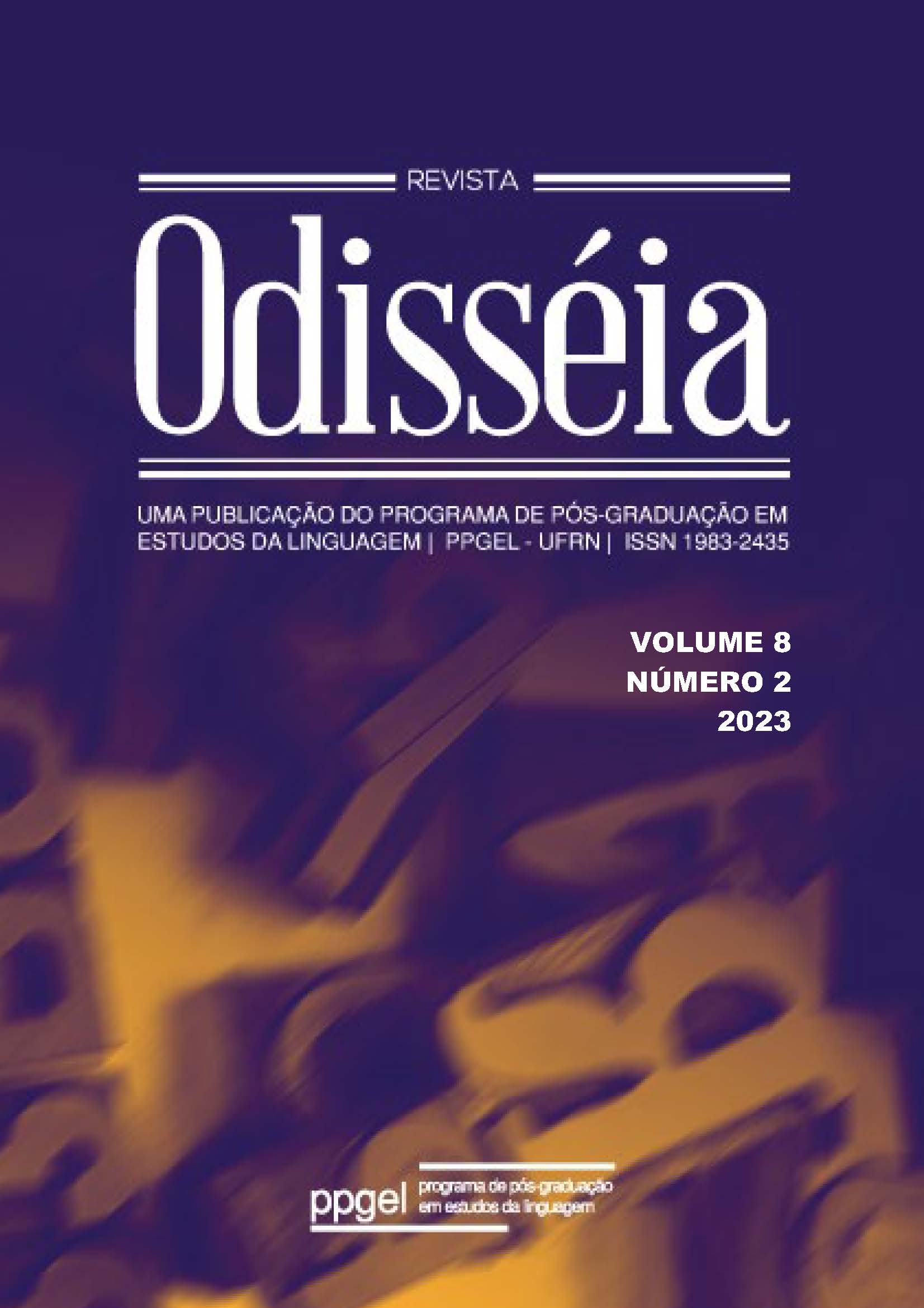The end of the world still takes time
new missives in the name of Jacques Derrida, from literature
DOI:
https://doi.org/10.21680/1983-2435.2023v8n2ID31513Keywords:
Jacques Derrida, Mourning, End of the World, Writing LossAbstract
The essay has three parallel movements, which seek to relate a non-overlap between theory and practice, when analyzing literary excerpts around mourning writings. At first, Derrida's assumptions around the end of the world are presented, not as a unified category, that is, the World, but rather as an equalization according to which, from the death of a loved one, one arrives at the end of a world, specifically. At that moment, it is presented, along the first movement, the second one, which shows certain passages from The year of magical thinking, by Joan Didion, and Crying in H Mart, by Michelle Zauner, in such a way as to manage some continuity to the Derridian thought, along some ways to complicate it, proposing some questions to the equalization of the previous movement. Finally, the opposite is suggested, based on the notion according to which it is understood that the World, when described as one, is a Eurocentric and Modern version of the word, having the Anthropocene as its apex, and seeing in the end of the World a positive idea, a welcome one, as it puts the colonial, racist experience, that sustains the project of Modernity, to an end. This movement is supported by the work of Jennette McCurdy, I'm glad my mom died, before the essay's conclusion, which completes the previous movements and thus tries to think of the end of the world as an interpretive key for the living, from themselves to themselves.
Downloads
References
ARANTES, Paulo E. Formação e desconstrução: uma visita ao museu da ideologia francesa. São Paulo: Editora 34; Duas Cidades, 2021.
CRITCHLEY, Simon; DERRIDA, Jacques; LACLAU, Ernesto; RORTY, Richard. Desconstrução e pragmatismo. Tradução de Victor Maia. Rio de Janeiro: Mauad X, 2017.
COLEBROOK, Claire. Slavery and the Trumpocene: It’s Not the End of the World. The Oxford Literary Review, v. 41, n. 1, p. 40-50, 2019.
COLEBROOK, Claire. Can theory end the world? Symploke, Nebraska, v. 29, n. 1-2, p. 521-534, 2021.
DERRIDA, Jacques. No apocalypse, not now: à toute vitesse, sept missiles, sept missives. Psyché: inventions de l'autre. Paris: Galilée, 1987.
DERRIDA, Jacques. Espectros de Marx: o Estado da dívida, o trabalho de luto e a nova internacional. Tradução de Anamaria Skinner. Rio de Janeiro: Relume Dumará, 1994.
DERRIDA, Jacques. Terei que errar só (1995). Tradução de Luciana A. Penna. Disponível em . Acesso em 14 dez. 2022.
DERRIDA, Jacques. Comment ne pas parler. Résistances de la psychanalyse. Paris: Galilée, 1996.
DERRIDA, Jacques. Mal de arquivo: uma impressão freudiana. Tradução de Cláudia de Moraes Rego. Rio de Janeiro: Relume Dumará, 2001.
DERRIDA, Jacques. [Introduction]. Rue Descartes, Paris, n. 48, Salut à Jacques Derrida, p. 6-7, 2005.
DERRIDA, Jacques. ¿Cómo no temblar? Tradução de Esther Cohen. Acta Poética, México, v. 30, n. 2, p. 19-34, 2010.
DERRIDA, Jacques. Seminario. La bestia y el soberano. Tradução de Luis Ferrero; Cristina de Peretti e Delmiro Rocha. Buenos Aires: Manantial, v. 2, 2011.
DERRIDA, Jacques. A escritura e a diferença. Tradução de Maria B. M. N. da Silva; Pedro L. Lopes e Pérola Carvalho. Campinas: Perspectiva, 2014.
DERRIDA, Jacques. A besta e o soberano — seminário. Tradução de Marco Casanova. Rio de Janeiro: Via Verita, v. 1, 2018.
DERRIDA, Jacques. Otobiografias — o ensinamento de Nietzsche e a política do nome próprio. Tradução de Guilherme Cadaval; Arthur Leão Roder e Rafael Haddock-Lobo. Copenhague/Rio de Janeiro: Zazie Edições, 2021.
DERRIDA, Jacques; BIRNBAUM, Jean. Learning to live finally: the last interview. Nova Iorque: Melville House Publishing, 2007.
DIDION, Joan. Blue nights. Tradução de Ana Maria Mesquita. Rio de Janeiro: Harper Collins Brasil, 2018.
DIDION, Joan. O ano do pensamento mágico. Tradução de Marina Vargas. Rio de Janeiro: Harper Collins Brasil, 2022.
EYBEN, Piero. Luto de origem: representar o que se reenvia como se…. ALEA, Rio de Janeiro, v. 21, n. 1, p. 17-36, 2019.
MCCURDY, Jennette. I'm glad my mom died. Nova Iorque: Simon & Schuster, 2022.
NAAS, Michael. The end of the world and other teachable moments: Jacques Derrida's final seminar. Nova Iorque: Fordham University Press, 2014.
YUSOFF, Kathryn. A Billion Black Anthropocenes or None. Minnesota: University of Minnesota Press, 2019.
WALLACE, David F. Isto é água. Ficando meio longe do fato de já estar meio longe de tudo. Tradução de Daniel Galera e Daniel Pellizzari. São Paulo: Companhia das Letras, 2012.
ZAUNER, Michelle. Aos prantos no mercado: memórias. Tradução de Ana Ban. São Paulo: Fósforo, 2022. Edição digital.
Downloads
Published
How to Cite
Issue
Section
License
Copyright (c) 2023 Odisseia

This work is licensed under a Creative Commons Attribution-NonCommercial-ShareAlike 4.0 International License.
Thisa work has been licensed under Creative Commons - Atribuição - NãoComercial - CompartilhaIgual 3.0 Não Adaptada.


















